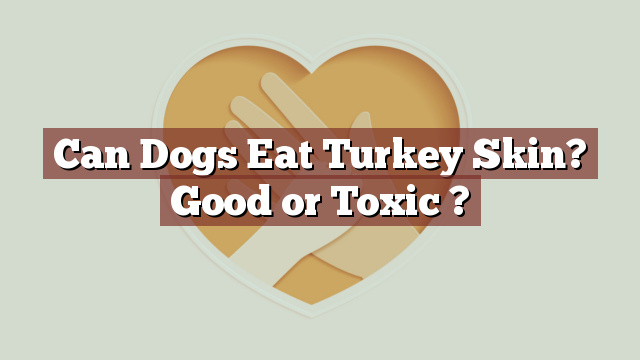Can Dogs Eat Turkey Skin? Good or Toxic?
Knowing what foods are safe for our pets is crucial for their health and well-being. Turkey is a popular choice during holiday seasons, and it’s important to consider whether it is safe for our canine companions to indulge in turkey skin. In this article, we will explore the nutritional value of turkey skin, discuss any safety concerns and risks involved, and provide guidance on what to do if your dog has consumed turkey skin.
Nutritional Value of Turkey Skin: Proteins, Fats, and More
Turkey skin is primarily composed of proteins and fats, which are essential for a dog’s diet. It contains high levels of protein, which helps build and repair body tissues. The fat content in turkey skin provides a concentrated source of energy for our furry friends. Additionally, turkey skin contains some vitamins and minerals, such as vitamin B12 and selenium.
Can Dogs Eat Turkey Skin? Safety Concerns and Risks Explained
Can dogs eat turkey skin? While turkey skin can be a tasty treat for your dog, it is important to exercise caution. The main concern with allowing dogs to consume turkey skin is the high fat content. Excessive fat intake can lead to pancreatitis, a potentially serious condition that causes inflammation of the pancreas. This condition can result in symptoms such as vomiting, diarrhea, and abdominal pain.
It’s worth noting that some dogs may have a sensitivity or allergy to poultry, including turkey. In such cases, eating turkey skin can lead to adverse reactions such as itching, skin rashes, or digestive issues.
Potential Risks or Benefits of Dogs Consuming Turkey Skin
The potential risks associated with dogs consuming turkey skin include the aforementioned pancreatitis and possible allergic reactions. It is also important to consider the size and breed of your dog. Smaller breeds and dogs with pre-existing health conditions may be more susceptible to the negative effects of consuming high-fat foods.
On the other hand, when fed in moderation, turkey skin can provide some health benefits to our furry friends. The protein content supports muscle development, and the fat content can help maintain a healthy coat and skin. However, it is crucial to ensure that the turkey skin is cooked thoroughly and free from any seasonings or additives that may be harmful to dogs.
My Dog Ate Turkey Skin! What Should I Do Now?
If your dog has consumed turkey skin, there are a few steps you can take depending on the situation. If your dog has eaten a small amount of turkey skin and shows no immediate signs of distress, you can monitor them closely for any changes in behavior or symptoms of pancreatitis. Ensure they have access to plenty of fresh water to stay hydrated.
However, if your dog has ingested a large quantity of turkey skin or is displaying concerning symptoms such as vomiting, diarrhea, or abdominal pain, it is recommended to contact your veterinarian immediately. They will be able to provide appropriate guidance based on your dog’s individual circumstances.
Conclusion: Moderation is Key, Consult Vet if Concerned
In conclusion, dogs can eat turkey skin, but it should be given in moderation and with caution. The high fat content can pose risks, particularly for dogs prone to pancreatitis or with existing health conditions. It is essential to monitor your dog’s reaction to turkey skin and seek veterinary advice if any concerning symptoms arise.
When sharing turkey with your furry friend, it is recommended to remove the skin and offer lean, cooked turkey meat instead. This way, you can minimize the risks associated with high-fat foods while still providing your dog with the nutritional benefits of turkey. As always, consulting with your veterinarian is the best course of action if you have any concerns or questions regarding your dog’s diet and health.
Thank you for investing your time in exploring [page_title] on Can-Eat.org. Our goal is to provide readers like you with thorough and reliable information about various dietary topics. Each article, including [page_title], stems from diligent research and a passion for understanding the nuances of our food choices. We believe that knowledge is a vital step towards making informed and healthy decisions. However, while "[page_title]" sheds light on its specific topic, it's crucial to remember that everyone's body reacts differently to foods and dietary changes. What might be beneficial for one person could have different effects on another. Before you consider integrating suggestions or insights from "[page_title]" into your diet, it's always wise to consult with a nutritionist or healthcare professional. Their specialized knowledge ensures that you're making choices best suited to your individual health needs. As you navigate [page_title], be mindful of potential allergies, intolerances, or unique dietary requirements you may have. No singular article can capture the vast diversity of human health, and individualized guidance is invaluable. The content provided in [page_title] serves as a general guide. It is not, by any means, a substitute for personalized medical or nutritional advice. Your health should always be the top priority, and professional guidance is the best path forward. In your journey towards a balanced and nutritious lifestyle, we hope that [page_title] serves as a helpful stepping stone. Remember, informed decisions lead to healthier outcomes. Thank you for trusting Can-Eat.org. Continue exploring, learning, and prioritizing your health. Cheers to a well-informed and healthier future!

